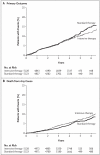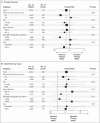Effects of intensive glucose lowering in type 2 diabetes
- PMID: 18539917
- PMCID: PMC4551392
- DOI: 10.1056/NEJMoa0802743
Effects of intensive glucose lowering in type 2 diabetes
Abstract
Background: Epidemiologic studies have shown a relationship between glycated hemoglobin levels and cardiovascular events in patients with type 2 diabetes. We investigated whether intensive therapy to target normal glycated hemoglobin levels would reduce cardiovascular events in patients with type 2 diabetes who had either established cardiovascular disease or additional cardiovascular risk factors.
Methods: In this randomized study, 10,251 patients (mean age, 62.2 years) with a median glycated hemoglobin level of 8.1% were assigned to receive intensive therapy (targeting a glycated hemoglobin level below 6.0%) or standard therapy (targeting a level from 7.0 to 7.9%). Of these patients, 38% were women, and 35% had had a previous cardiovascular event. The primary outcome was a composite of nonfatal myocardial infarction, nonfatal stroke, or death from cardiovascular causes. The finding of higher mortality in the intensive-therapy group led to a discontinuation of intensive therapy after a mean of 3.5 years of follow-up.
Results: At 1 year, stable median glycated hemoglobin levels of 6.4% and 7.5% were achieved in the intensive-therapy group and the standard-therapy group, respectively. During follow-up, the primary outcome occurred in 352 patients in the intensive-therapy group, as compared with 371 in the standard-therapy group (hazard ratio, 0.90; 95% confidence interval [CI], 0.78 to 1.04; P=0.16). At the same time, 257 patients in the intensive-therapy group died, as compared with 203 patients in the standard-therapy group (hazard ratio, 1.22; 95% CI, 1.01 to 1.46; P=0.04). Hypoglycemia requiring assistance and weight gain of more than 10 kg were more frequent in the intensive-therapy group (P<0.001).
Conclusions: As compared with standard therapy, the use of intensive therapy to target normal glycated hemoglobin levels for 3.5 years increased mortality and did not significantly reduce major cardiovascular events. These findings identify a previously unrecognized harm of intensive glucose lowering in high-risk patients with type 2 diabetes. (ClinicalTrials.gov number, NCT00000620.)
2008 Massachusetts Medical Society
Figures



Comment in
-
Redefining quality--implications of recent clinical trials.N Engl J Med. 2008 Jun 12;358(24):2537-9. doi: 10.1056/NEJMp0803740. Epub 2008 Jun 6. N Engl J Med. 2008. PMID: 18539915 No abstract available.
-
Intensive glycemic control in the ACCORD and ADVANCE trials.N Engl J Med. 2008 Jun 12;358(24):2630-3. doi: 10.1056/NEJMe0804182. Epub 2008 Jun 6. N Engl J Med. 2008. PMID: 18539918 No abstract available.
-
Glycemic targets and cardiovascular disease.N Engl J Med. 2008 Jun 12;358(24):2633-5. doi: 10.1056/NEJMe0803831. Epub 2008 Jun 6. N Engl J Med. 2008. PMID: 18539919 No abstract available.
-
Intensive glucose control increased mortality and did not prevent cardiovascular events in type 2 diabetes.ACP J Club. 2008 Sep 16;149(3):6-7. ACP J Club. 2008. PMID: 18783183 No abstract available.
-
Intensive glucose control in type 2 diabetes.N Engl J Med. 2008 Oct 2;359(14):1519; author reply 1520-1. doi: 10.1056/NEJMc081457. N Engl J Med. 2008. PMID: 18832252 No abstract available.
-
Intensive glucose control in type 2 diabetes.N Engl J Med. 2008 Oct 2;359(14):1519-20; author reply 1520-1. N Engl J Med. 2008. PMID: 18837144 No abstract available.
-
Intensive glucose control in type 2 diabetes.N Engl J Med. 2008 Oct 2;359(14):1520; author reply 1520-1. N Engl J Med. 2008. PMID: 18837145 No abstract available.
-
Is glucose normalization an evidence-based treatment for patients with type 2 diabetes mellitus?Nat Clin Pract Endocrinol Metab. 2009 Jan;5(1):8-9. doi: 10.1038/ncpendmet0997. Epub 2008 Oct 28. Nat Clin Pract Endocrinol Metab. 2009. PMID: 18957955 No abstract available.
-
[ACCORD and ADVANCE studies].Kardiol Pol. 2008 Sep;66(9):1013-7; discussion 1017-9. Kardiol Pol. 2008. PMID: 19004118 Polish. No abstract available.
-
Intensive glucose control increased mortality and did not prevent cardiovascular events in type 2 diabetes.Evid Based Med. 2008 Dec;13(6):168-9. doi: 10.1136/ebm.13.6.169. Evid Based Med. 2008. PMID: 19043027 No abstract available.
-
More is not always better: intensive glycemic control in type 2 diabetes.Am J Kidney Dis. 2009 Jan;53(1):12-5. doi: 10.1053/j.ajkd.2008.11.001. Am J Kidney Dis. 2009. PMID: 19101398 No abstract available.
-
Intensive glucose control increased mortality and did not prevent cardiovascular events in type 2 diabetes.Evid Based Nurs. 2009 Jan;12(1):12-3. doi: 10.1136/ebn.12.1.13. Evid Based Nurs. 2009. PMID: 19103831 No abstract available.
-
Preventing cardiovascular disease in type 2 diabetes: where do things stand with glycemic control? Part one.Curr Diab Rep. 2009 Feb;9(1):7-8. doi: 10.1007/s11892-009-0002-0. Curr Diab Rep. 2009. PMID: 19192417 No abstract available.
-
Diabetes Control and Cardiovascular Risk: ACCORD, ADVANCE, AVOID, and SANDS.Prev Cardiol. 2008 Fall;11(4):230-6. doi: 10.1111/j.1751-7141.2008.00006.x. Prev Cardiol. 2008. PMID: 19476576 No abstract available.
References
-
- Goff DC, Jr, Gerstein HC, Ginsberg HN, et al. Prevention of cardiovascular disease in persons with type 2 diabetes mellitus: current knowledge and rationale for the Action to Control Cardiovascular Risk in Diabetes (ACCORD) trial. Am J Cardiol. 2007;99:4i–20i. - PubMed
-
- Selvin E, Marinopoulos S, Berkenblit G, et al. Meta-analysis: glycosylated hemoglobin and cardiovascular disease in diabetes mellitus. Ann Intern Med. 2004;141:421–31. - PubMed
-
- Gerstein HC, Pogue J, Mann JF, et al. The relationship between dysglycaemia and cardiovascular and renal risk in diabetic and non-diabetic participants in the HOPE study: a prospective epidemiological analysis. Diabetologia. 2005;48:1749–55. - PubMed
-
- American Diabetes Association Standards of medical care in diabetes — 2008. Diabetes Care. 2008;31(Suppl 1):S12–S54. - PubMed
Publication types
MeSH terms
Substances
Associated data
Grants and funding
- N01 HC095179/HL/NHLBI NIH HHS/United States
- N01 HC095184/HL/NHLBI NIH HHS/United States
- N01-HC-95180/HC/NHLBI NIH HHS/United States
- N01 HC095178/HL/NHLBI NIH HHS/United States
- IAA-Y1-HC-1010/HC/NHLBI NIH HHS/United States
- N01 HC095182/HL/NHLBI NIH HHS/United States
- N01-HC-95183/HC/NHLBI NIH HHS/United States
- N01-HC-95178/HC/NHLBI NIH HHS/United States
- N01-HC-95179/HC/NHLBI NIH HHS/United States
- N01-HC-95181/HC/NHLBI NIH HHS/United States
- IAA-Y1-HC-9035/HC/NHLBI NIH HHS/United States
- N01 HC095180/HL/NHLBI NIH HHS/United States
- Y01 HC001010/HC/NHLBI NIH HHS/United States
- Y01 HC009035/HC/NHLBI NIH HHS/United States
- N01 HC095181/HL/NHLBI NIH HHS/United States
- P30 NR005035/NR/NINR NIH HHS/United States
- N01-HC-95184/HC/NHLBI NIH HHS/United States
- N01-HC-95182/HC/NHLBI NIH HHS/United States
- N01 HC095183/HL/NHLBI NIH HHS/United States
LinkOut - more resources
Full Text Sources
Other Literature Sources
Medical
Molecular Biology Databases
Research Materials
